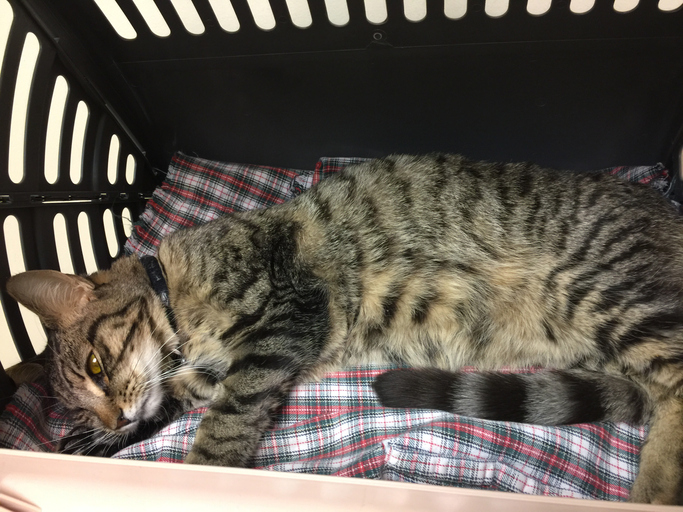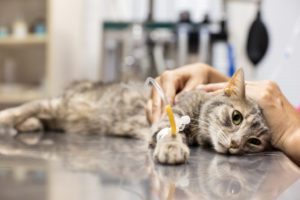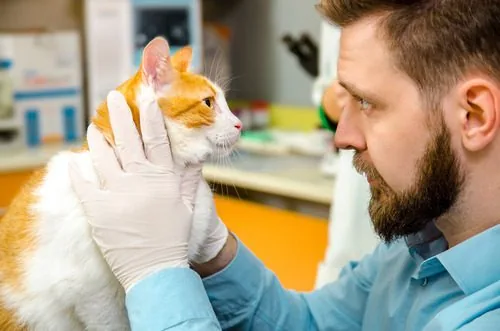What is FIP in Cats in Plymouth Meeting, PA?
FIP is a disease that affects cats who live in multi-cat households, shelters, and colonies. Fortunately, most cats who carry the feline coronavirus do not contract FIP.
FIP stands for Feline Infectious Peritonitis, an insidious viral illness that cats may get if they come in contact with the feline coronavirus. Unfortunately, the disease often has a lethal outcome. Currently, clinical trials and research may potentially save cats’ lives.
The symptoms of FIP depend on what type of FIP the cat has. If you need to know more about FIP in cats, this article can help.
What Exactly is FIP in Cats?
Feline Infectious Peritonitis is an appalling, typically fatal viral disease in cats. A severe illness spreads throughout the cat’s body, triggering total body inflammation. When the feline coronavirus transforms into the type of virus that can sometimes trigger the disease, it is known as the FIP virus. There are two types of FIP:
- Wet FIP- The wet type of FIP causes fluid to build up in the abdomen and chest. It causes a swollen belly and difficulty breathing.
- Dry FIP – The dry type of FIP irritating lesions are observed in the eyes, kidneys, liver, and nervous systems
Cats affected by the feline coronavirus usually mount an immune reaction through which antibodies opposed to the virus are created. In about 10 percent of cats with feline coronavirus, one or more transformations result in white blood cells being contaminated by the virus and propagating throughout the cat’s body.
When the virus transmutes in this fashion, it is referred to as FIPV. A reaction is triggered, affecting the vessels in the tissues where the infected cells exist in the body. The contact between the virus and the immune system results in FIP.
Cats can acquire FIP at any age; however, it is most commonly found in young cats between six and twenty-four months. Once a cat is diagnosed with FIP, it is nearly always fatal without therapy. Fortunately, the disease is extremely rare.

What Causes FIP?
FIP is caused by a certain mutation of the feline coronavirus. A coronavirus is a grouping of viruses contaminating various animals’ upper respiratory or intestinal tract. It is not the same as COVID-19, which affects humans, as FIP only affects cats. The most common way that feline coronavirus is said to occur is when a mother cat passes the virus to her kittens.
Cats living in a shelter seem more prone to developing FIP from the feline coronavirus. Cats kept in multi-cat homes, or cat colonies may also have a possible risk. It often occurs when cats share litterboxes, as the feline coronavirus can be shed in the feces. At risk, cats can come to be infected with the coronavirus when they groom or eat.
However, it is essential to note that finding the coronavirus in a cat does not mean that they have FIP. It only means a higher risk is involved, especially when many cats are in a given area. Purebred cats have been linked with a higher risk of developing FIP, and male cats are more commonly affected than female cats.
What Are Symptoms of FIP?
Once FIP takes hold in the body, it causes your cat many problems. The first signs of FIP in cats are non-specific, which means that they are not unique to FIP:
- Lack of appetite
- Consistent fever
- Weight loss
- Lack of energy
A cat with FIP may also present with a rough, dull coat. They may also be depressed and not act like themselves.
What Are the Symptoms of Wet FIP?
Wet FIP is different from Dry FIP. They have their unique symptoms. The following include the symptoms of Wet FIP:
- Distended or swollen belly
- Fluid-filled chest
- Trouble breathing
- Sneezing
With Wet FIP, kittens may not be able to gain weight. Indications of Wet FIP tend to develop and develop swiftly, and symptoms of Dry FIP have a tendency to grow slowly. Distressing respiratory symptoms characterize wet FIP.
What Are Symptoms of Dry FIP?
Dry FIP is not as aggressive at first as Wet FIP. Dry FIP will take more time to demonstrate specific symptoms of FIP:
- Seizures
- Incoordination
- Diarrhea
- Anemia
Cats with Dry FIP may present with eye inflammation and can experience sudden blindness. Cats may also exhibit both Wet FIP and Dry FIP simultaneously. Generally, the symptoms a cat will experience depend on which organ is most affected by the illness.

What is Treatment for FIP?
FIP is a serious disease, and while it typically results in a fatality, there have been some developments in the past few years to help manage and treat the condition. Anti-viral medications, such as GS-5734 and GS- 441524, may be successful. Some medications are legally available in the United Kingdom and Australia. Supportive care may be suggested to help increase the feline’s quality of life.
Right now, there are no legally approved treatments for FIP available in the United States. Unfortunately, the prognosis for FIP is typically grave. However, many veterinary groups are actively researching how to treat the disease.
If your cat tests positive for FIP, talk to your veterinarian about enrolling them in any clinical trials recruiting patients. CL-Pro and Remdesivir are also currently considered viable options to treat the disease.
A cat named Smoky was one of the first cats ever to beat FIP! It is all thanks to UC Davis research that Smoky was able to survive. He was enrolled in a medical trial and was restored to health. Smoky is now the poster kitty for beating FIP!
The investigated trial may also help children who need treatment for multisystem inflammatory syndrome, a condition in which the organs and other body parts become inflamed. The illness is closely associated with COVID-19.
How to Protect Your Cat
You can protect your cat from potentially developing FIP infection by preventing them from contracting the feline coronavirus. In a multi-cat situation, you may be able to protect them by limiting cats to three per room, which decreases the stress that may be triggered by having a large group of cats in a specified area.
The feline coronavirus itself is very contagious, as it is passed through the feces and saliva of the infected cats. You can help protect your cat by maintaining their health as best as their pet parent and ensuring they are vaccinated against certain illnesses, like feline leukemia. Litter boxes should also be scrubbed regularly and positioned away from foodstuff and water bowls.
There is a FIP vaccine accessible in some countries. However, this vaccine is in the not generally recommended category of vaccines. Its effectiveness is yet to be seen. The vaccine is given to cats at 16 weeks old, but many kittens are commonly exposed to the feline coronavirus long before they are eligible for a vaccine. There is incomplete evidence to prove that the vaccine is beneficial.
Conclusion
FIP is a serious illness that often has a fatal outcome. However, if veterinary research and clinical trials continue, more cats like Smoky can be saved, and new treatments can develop to help cats beat FIP.
For cat parents in the Plymouth Meeting, PA area, The Village Vets are available to serve you and your dog. Call us today at (484) 820-1700 or make an appointment.
Recent Posts
About Veterinary Village
Veterinary Village offers excellent service to clients in a comfortable, friendly atmosphere. To learn more about us and how we can better serve you and your pet here in Plymouth Meeting, PA, click the button below.
Share This Post
Recent Posts
About Veterinary Village
Veterinary Village is a network of three animal hospitals based in Atlanta, GA and the surrounding area. We offer honest, excellent service to our clients in a comfortable, friendly atmosphere. To learn more about our locations and how we can better serve you and your pet, click the button below.



